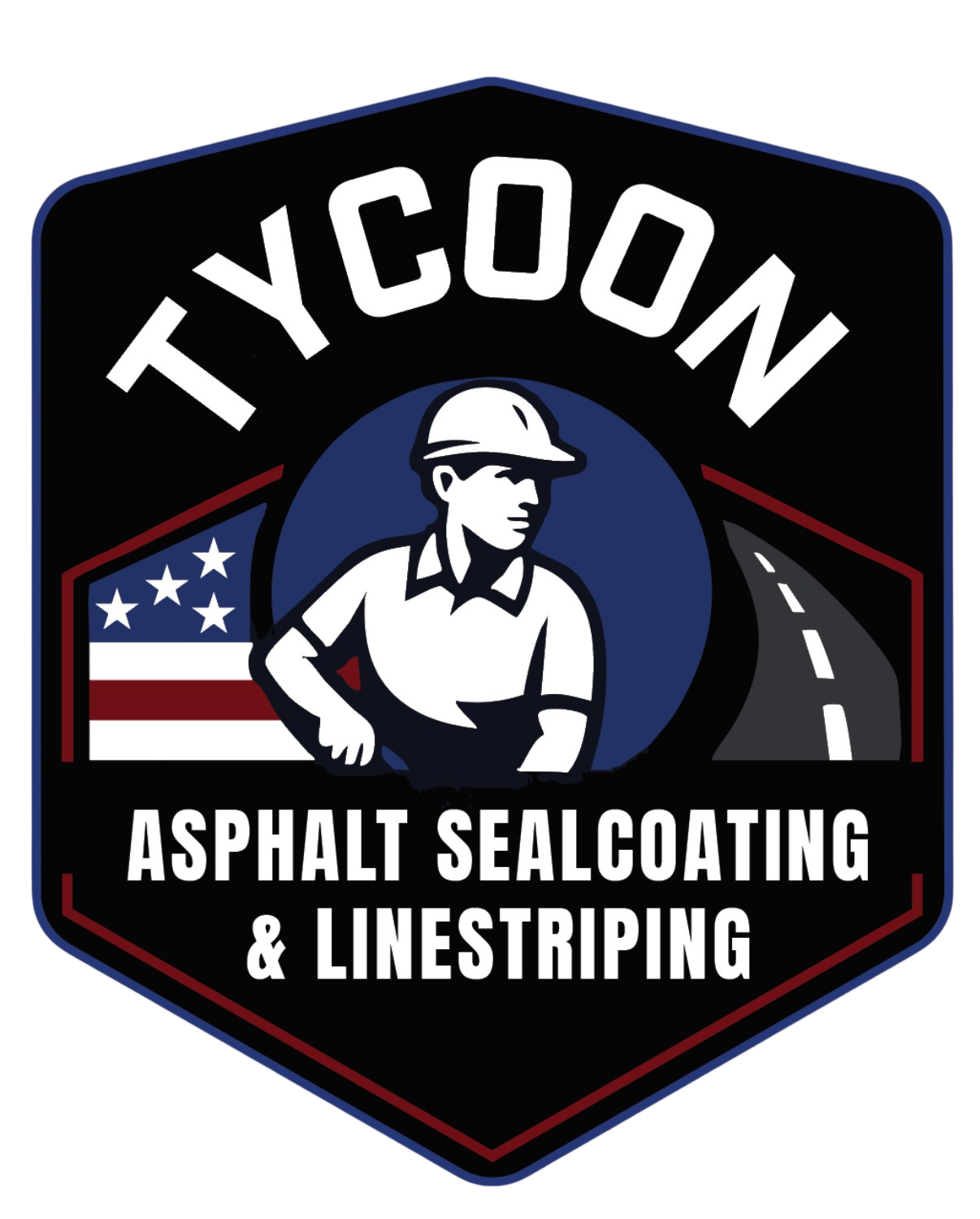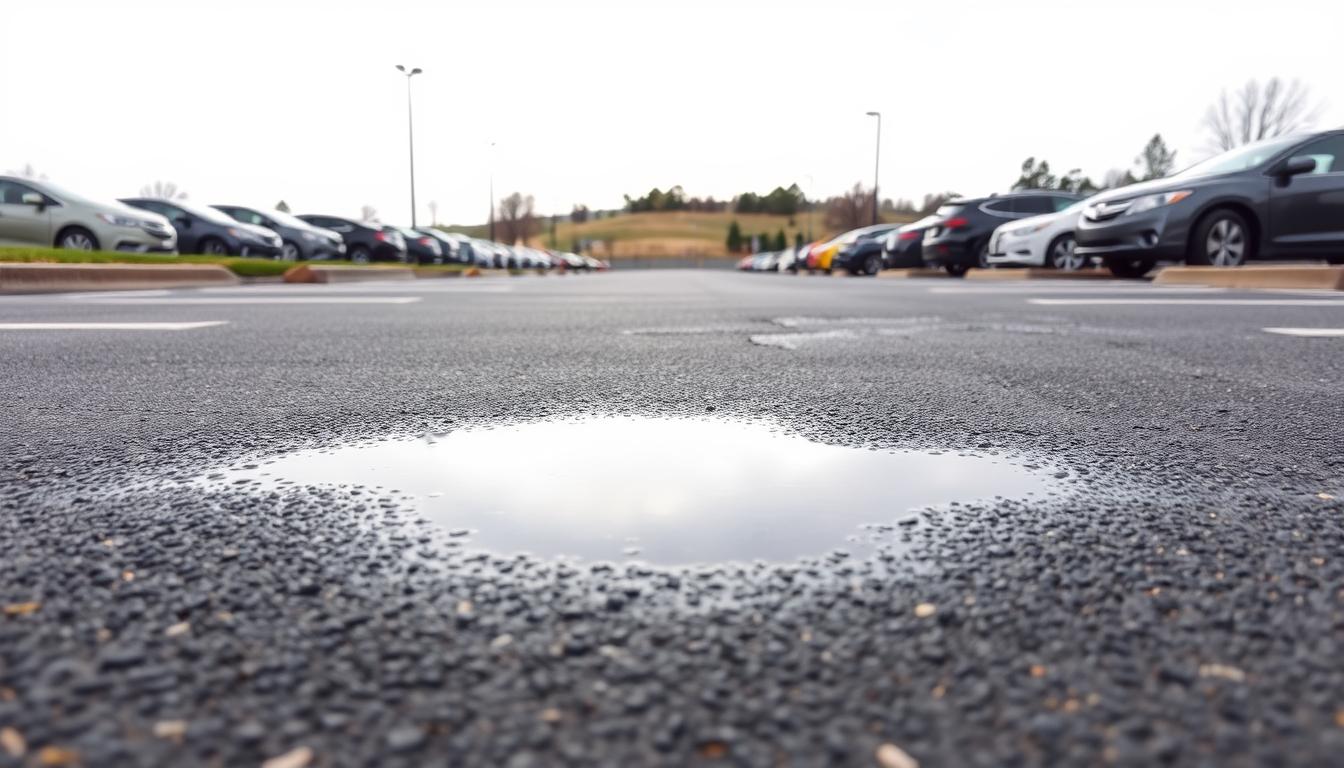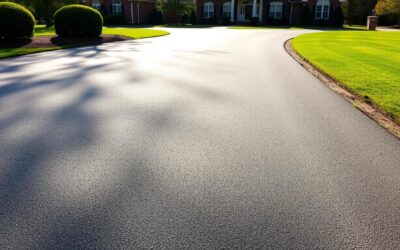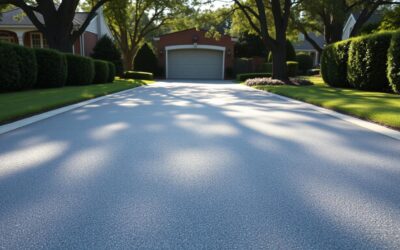We see how sudden storms and heavy clay soils overwhelm hard surfaces across our region. Standing water and a small grade error can push water toward buildings and ruin a parking lot fast.
Our team works across North Carolina and nearby South Carolina to assess each property. We evaluate patterns, then explain fixes that range from small grade corrections to full paving and permeable systems.
Safety guides our approach. Ponding raises hydroplaning and ice risks and creates trip hazards that expose owners to liability. Our expert services cover diagnostics, design, and build so a lot stays usable longer.
Good surface and base care reduce base saturation and prevent cracking, rutting, and potholes. We tailor plans to local storm rules, cut lifetime costs, and protect curb appeal for commercial and multifamily sites.
Smart Asphalt Drainage Solutions for Charlotte Properties
Our team designs smart surface solutions that keep water moving off lots fast. We combine grading, subsurface systems, and careful material selection to deliver proper drainage that resists clay-heavy soil and intense storms common here.
We offer permeable choices like Permeable Interlocking Concrete Pavers (PICP), porous asphalt mixes, and pervious concrete. Each option reduces runoff, filters pollutants, and helps recharge groundwater while meeting local stormwater management goals.
During design we set capture points, overflow paths, and install underdrains, inlets, or swales where needed. That ensures surfaces manage peak events without sending water toward buildings or neighboring property.
We help clients pick systems based on load, look, maintenance appetite, and budget. Our services focus on life-cycle value so improved pavement performance lowers future repairs and service disruptions.
Why Standing Water and Bad Slope Damage Parking Lots and Driveways
Pooling on a lot starts small but quickly grows into costly pavement failures when left unchecked. We see how trapped water soaks through surface layers and weakens the base below.
Common causes include clay-heavy soil that holds moisture, sudden severe weather, and poor grading that sends flow the wrong way. These conditions let water linger in low areas and edges where vehicles turn most often.
That trapped moisture speeds material breakdown. Water seeps into hairline cracks, then freezes and expands or softens binder under heat. The result is widening cracks, potholes, and base failure that demand major repairs.
Safety risks rise as surfaces deform. Wet areas increase hydroplaning and create black ice in winter. Uneven pavement and broken edges become trip hazards, raising liability for owners and managers.
Regular inspections catch early signs like surface wear and small cracks. We recommend sealing defects quickly and fixing water flow first so new paving or repairs last longer and protect the investment.
asphalt drainage slope charlotte: How We Fix It Right the First Time
Every project starts with a careful site survey so we can correct low spots and protect pavement life. Our turnkey parking lot delivery covers grading, proper drainage, asphalt installation, and line striping to industry standards.
Precision grading and compaction
We use elevations and spot shots to set positive flow and remove birdbaths. Then we compact the subgrade and aggregate base to spec so the pavement holds its shape under traffic.
Right systems for each lot
We design and install swales, inlets, and underdrains tailored to site conditions. Tie-ins to utilities and building edges keep water away from entries and walkways.
Turnkey installations and oversight
Our team coordinates paving, ADA markings, and striping so lanes and accessible routes remain clear. We validate compaction, elevations, and inlet placement during build.
We finish every project with a punch list and a post-storm check so clients see the new pavement management works as designed. That attention helps us deliver a durable, right first outcome.
Permeable and Porous Paving Options That Reduce Runoff
Permeable surfaces give property owners a practical way to reduce runoff while keeping parking areas functional. We explain three common options and how each performs under traffic, appearance needs, and maintenance expectations.
Porous asphalt for high-traffic parking areas
Porous asphalt uses fewer fines so water filters through the mix and into the base. We recommend it where smooth driving surfaces and durability matter most.
Permeable interlocking concrete pavers for drive lanes and spaces
PICP uses wider joints filled with aggregate to let water flow quickly into a reservoir base. That design balances curb appeal and infiltration for drive lanes and parking lot spaces.
Pervious concrete and stabilized gravel for walkways and low-speed areas
Pervious concrete has extra void space, and stabilized gravel offers a simple, low-speed solution. Both work well for sidewalks and small access areas where accessibility and recharge are priorities.
We design an open-graded stone base as temporary storage and control how water moves into underdrains or native soil. Routine sweeping or occasional vacuuming keeps pores and joints clear. Avoid sealers or aggressive pressure washing so permeability lasts.
Our Turnkey Parking Lot Paving Process for Optimal Drainage
We manage each project from first call to final walk-through so your lot returns to safe, usable service quickly.
Site prep, base grading, asphalt installation, and traffic-ready finishes
We start with thorough site prep: clearing, proof-rolling, and fixing subgrade issues to set base grades for positive flow.
Next, we place and compact aggregate base to spec and check elevations so water moves to inlets or edges without pooling.
Our asphalt installation uses mix designs matched to traffic and climate. That ensures smooth surfaces that resist rutting and hold grade.
We coordinate concrete work like curbs and ADA ramps to integrate transitions. Then we complete striping, stencils, and traffic markings so the parking layout is clear.
We stage work to cut downtime, communicate time windows, and quality-check compaction and thickness at each lift.
Finally, we deliver a project walk-through, maintenance tips, and post-install support so your team can protect performance after the job ends.
Proactive Maintenance: Keep Water Out and Pavement Strong
Timely inspections reveal hidden wear before it undermines the pavement base. We focus on routine checks so small defects never become large repairs.
Inspections, crack sealing, and pothole repairs
We perform scheduled inspections to spot fine cracks, surface wear, and early ponding. Catching these signs lets us address root causes before water reaches the base.
Our team prioritizes crack sealing with flexible compounds that move with the surface. That prevents water infiltration and preserves structural strength.
When potholes or localized failures appear, we apply durable patches and correct underlying base issues so the same spot does not fail again.
Sealcoating schedule and curing time guidance
We recommend professional sealcoating every 3–4 years in warmer months to shield the surface from UV, salt, fuel, and water. Recoating protects look and extends life.
Typical curing guidance: walk-on after about 3–4 hours and drive-on after 24–48 hours, depending on temperature and humidity. We communicate exact time windows before work begins.
Our services include sweeping, drain clearing, oil-spot treatment, and maintenance practices that keep a lot storm-ready. We track history so budgets and timing stay predictable.
Line Striping, ADA Compliance, and Traffic Flow Planning
Clear markings and smart layouts help cars and people move safely through every lot we service. We deliver turnkey plans so sites are compliant and ready when the work is done.
Efficient layouts for retail, apartments, churches, and commercial lots
We design striping plans that maximize spaces while keeping drive aisles, fire lanes, and sight lines clear. That preserves safe circulation and reduces bottlenecks.
Our team applies ADA markings, accessible routes, curb ramps, and signage so everyone can navigate the property. These compliant touches also protect clients from enforcement issues.
We plan traffic patterns with proper radii, turn bays, and crosswalks to cut conflicts. Durable coatings on asphalt and concrete improve visibility in day, night, and wet conditions.
We coordinate layout decisions with surface and storm concerns so accessible parking and paths avoid ponding zones. We also offer re-striping and scheduled services to keep markings vibrant over time.
Work is phased around operating hours to minimize disruption for retail, multifamily, and worship sites. Our practices help management keep lots safe and functional long after we leave.
Ready Today to Help in Charlotte, NC and Nearby Carolina Markets
Start your project today with a clear proposal and an experienced team focused on lasting results.
.
We’re ready today to mobilize across Charlotte, north carolina, and nearby south carolina markets. Our full-scope services include grading, drainage fixes, paving, asphalt paving, and concrete work to restore your parking lot or lots.
We scope projects fast so you get a timeline, cost, and plan before work begins. We handle installations, ADA-compliant access, and line striping so lots open ready for traffic and safety.
Our crew stays on schedule and provides ongoing repairs, crack sealing, and periodic sealcoat guidance to protect your pavement and reduce life-cycle cost.
Contact us today to schedule a lot assessment and start a project that solves water issues and protects your property.




0 Comments